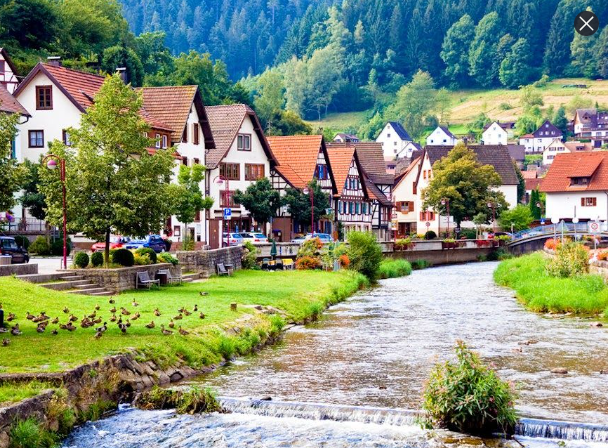I think that it isn’t so easy. The necessary infrastructure depends on the number of people rather than the number of buildings (electricity, water, pipes, streets, etc). An urbanization with individual houses can generate its energy needs sufficiently with decentralized solar and wind panels, which is not possible for the same number of people in a single building. The best example is the environmental impact of towns with individual houses and small buildings, comparing the impact of large, densely populated cities, which even influence the climate. The real world is not an island, as this drawing of yours suggests.
Large cities with huge buildings cannot be integrated into nature they always replace it.
[Environment] Sewage, water, and electricity lines don’t require n^2 sprawl
[Livelihood] Better public transportation
[Livelihood] Closer to nature (your image is a joke and not how most house-based neighborhoods look)
It’s easy to see big cities like NYC and think “that’s bad for the environment”, but it’s easier to forget how much worse it would be if everyone lived in houses.
How many walable citys do you know with fewer cars, preserving extra space (Parks are no woods or nature), a good public transport and closer to nature?
How to make a big building energy autonom? Big aglomerations are not the way.
Energy by nuclear is a joke for several reasons. Even if you show the article from the gov, which shurly is objective and independent, the realyty is other. Come to Europe and see the problems with nukes they had and its form of housing.
How many walable citys do you know with fewer cars, preserving extra space (Parks are no woods or nature), a good public transport and closer to nature?
I live in SE Asia and the answer is “almost all of them”
I’ve always seen per-house solar panels to supplement the energy requirement which is mostly met through conventional means. Do you have an example of “decentralised solar and wind” energy meet the needs completely?
Several, here in Spain there are quite a few chalets that use solar roofs for their own consumption and even have surpluses to repay surpluses to the network. Decentralizing energy production is a more efficient way than centralized production, naturally the energy industry is still putting obstacles, but this is already changing little by little. People realize that a house can be energetically self-sufficient with current technologies.
https://www.homebiogas.com/blog/energy-self-sufficient-home/
It’s more efficient because you’re constantly producing energy that you don’t always need, so you feed it back into the grid that otherwise burns coal/etc to make up the deficit.
Is it good? Yes. Does that mean houses are better than apartments? Lol no
I think that it isn’t so easy. The necessary infrastructure depends on the number of people rather than the number of buildings (electricity, water, pipes, streets, etc). An urbanization with individual houses can generate its energy needs sufficiently with decentralized solar and wind panels, which is not possible for the same number of people in a single building. The best example is the environmental impact of towns with individual houses and small buildings, comparing the impact of large, densely populated cities, which even influence the climate. The real world is not an island, as this drawing of yours suggests. Large cities with huge buildings cannot be integrated into nature they always replace it.
You’re completely ignoring just about every other reason apartments are better.
It’s easy to see big cities like NYC and think “that’s bad for the environment”, but it’s easier to forget how much worse it would be if everyone lived in houses.
And to the point of energy - Use nuclear.
https://www.ons.gov.uk/peoplepopulationandcommunity/housing/articles/energyefficiencyofhousinginenglandandwales/2021 ↩︎
How many walable citys do you know with fewer cars, preserving extra space (Parks are no woods or nature), a good public transport and closer to nature? How to make a big building energy autonom? Big aglomerations are not the way. Energy by nuclear is a joke for several reasons. Even if you show the article from the gov, which shurly is objective and independent, the realyty is other. Come to Europe and see the problems with nukes they had and its form of housing.
I live in SE Asia and the answer is “almost all of them”
I’ve always seen per-house solar panels to supplement the energy requirement which is mostly met through conventional means. Do you have an example of “decentralised solar and wind” energy meet the needs completely?
Several, here in Spain there are quite a few chalets that use solar roofs for their own consumption and even have surpluses to repay surpluses to the network. Decentralizing energy production is a more efficient way than centralized production, naturally the energy industry is still putting obstacles, but this is already changing little by little. People realize that a house can be energetically self-sufficient with current technologies. https://www.homebiogas.com/blog/energy-self-sufficient-home/
How is it more efficient?
It’s more efficient because you’re constantly producing energy that you don’t always need, so you feed it back into the grid that otherwise burns coal/etc to make up the deficit.
Is it good? Yes. Does that mean houses are better than apartments? Lol no